Peter Faber Business School ACCT209: CSR Report Comparative Analysis
VerifiedAdded on 2023/06/08
|12
|2079
|90
Report
AI Summary
This report undertakes a comparative analysis of the Corporate Social Responsibility (CSR) reports of AGL Energy and Origin Energy, both prominent entities within the Australian energy sector. The study begins with an executive summary and introduction to CSR and sustainability accounting, emphasizing their connection to stakeholder accountability. The core of the report involves a detailed discussion and critical analysis of key questions surrounding CSR, including its definitions, legislative requirements, and alignment with financial accounting theories. A comparative analysis is then performed, evaluating the quality and quantity of information disclosed in the CSR reports of both companies. This includes assessing whether the reports are merely public relations exercises, measuring corporate responsibility performance against benchmarks, the extent of critical information provided, the laying out of tangible objectives, and the trustworthiness of the corporations. The report concludes with a summary of the findings, highlighting the strengths and weaknesses of each company's approach to CSR and sustainability reporting. The report also provides a comprehensive list of references to support its findings and analysis. The report adheres to the guidelines of the Global Reporting Initiative (GRI) for sustainability reporting and considers the national and sectoral context influencing these companies' CSR practices.
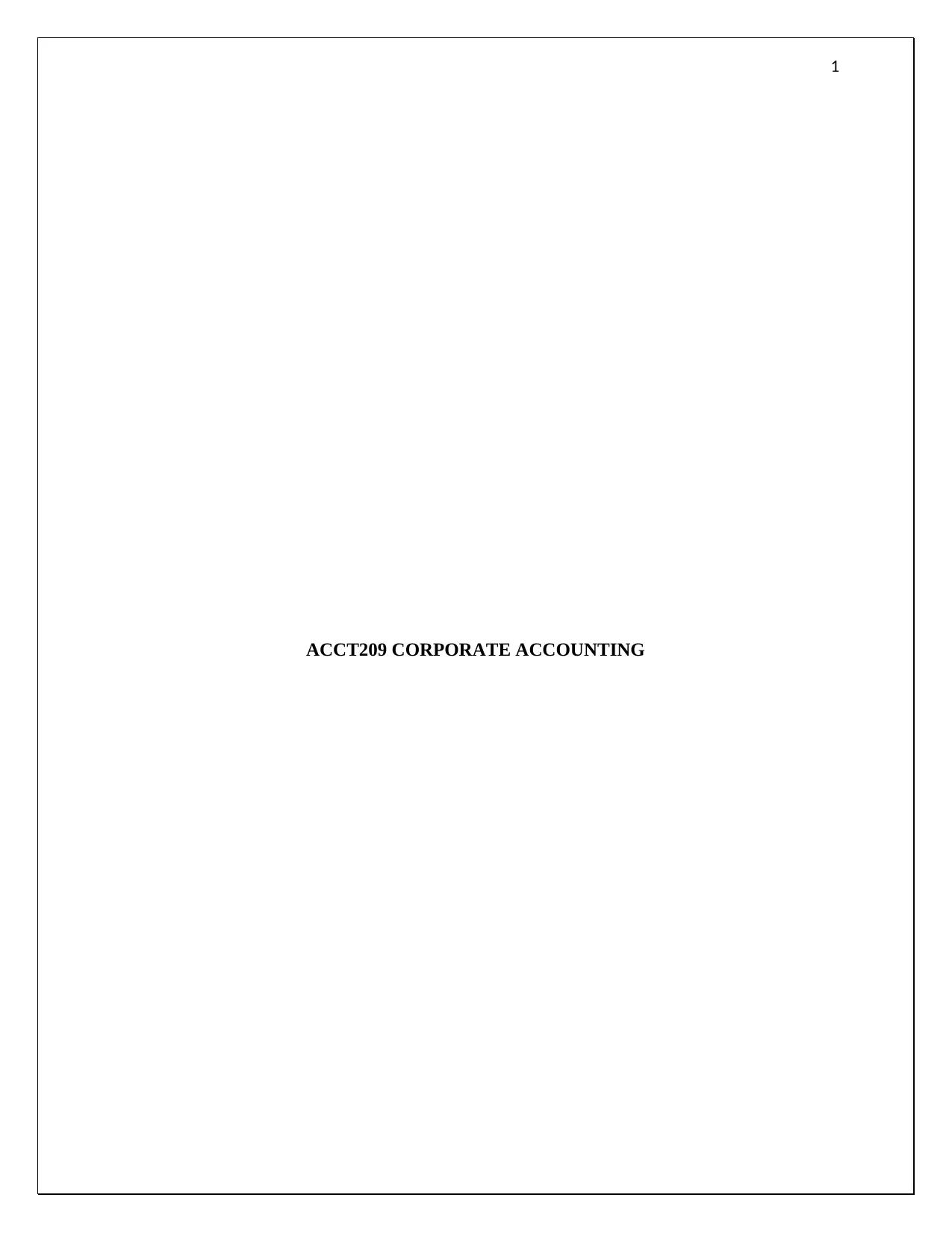
1
ACCT209 CORPORATE ACCOUNTING
ACCT209 CORPORATE ACCOUNTING
Paraphrase This Document
Need a fresh take? Get an instant paraphrase of this document with our AI Paraphraser
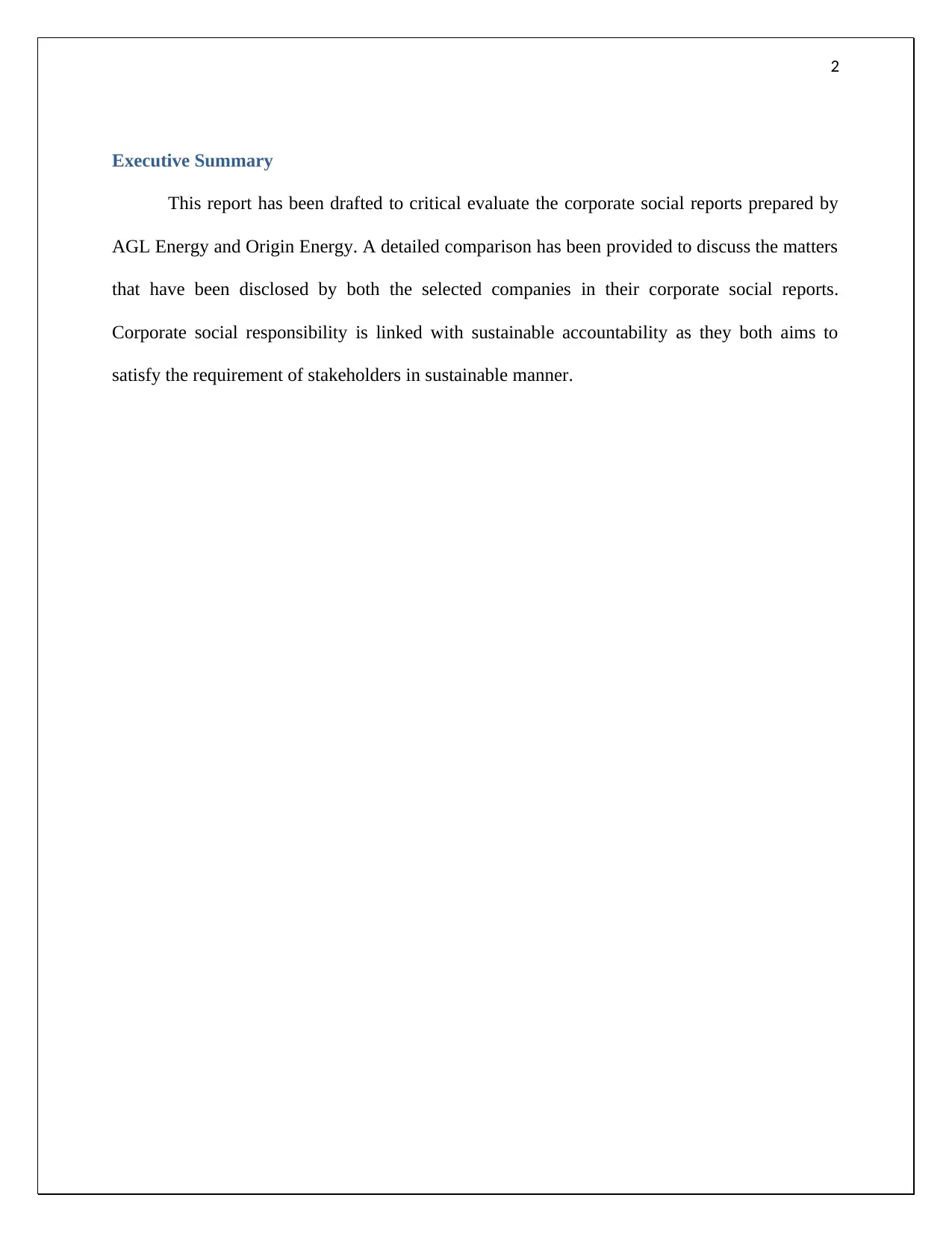
2
Executive Summary
This report has been drafted to critical evaluate the corporate social reports prepared by
AGL Energy and Origin Energy. A detailed comparison has been provided to discuss the matters
that have been disclosed by both the selected companies in their corporate social reports.
Corporate social responsibility is linked with sustainable accountability as they both aims to
satisfy the requirement of stakeholders in sustainable manner.
Executive Summary
This report has been drafted to critical evaluate the corporate social reports prepared by
AGL Energy and Origin Energy. A detailed comparison has been provided to discuss the matters
that have been disclosed by both the selected companies in their corporate social reports.
Corporate social responsibility is linked with sustainable accountability as they both aims to
satisfy the requirement of stakeholders in sustainable manner.
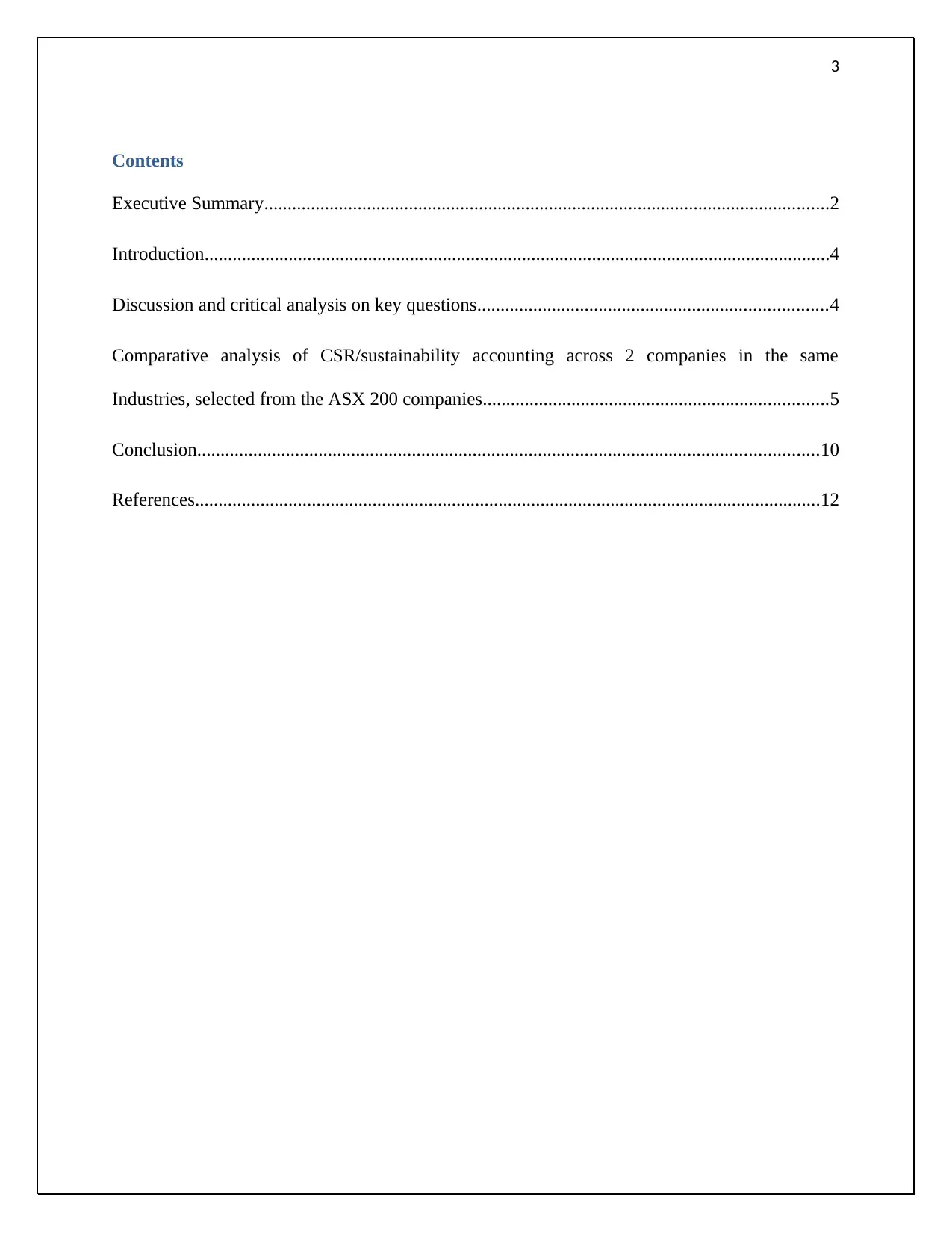
3
Contents
Executive Summary.........................................................................................................................2
Introduction......................................................................................................................................4
Discussion and critical analysis on key questions...........................................................................4
Comparative analysis of CSR/sustainability accounting across 2 companies in the same
Industries, selected from the ASX 200 companies..........................................................................5
Conclusion.....................................................................................................................................10
References......................................................................................................................................12
Contents
Executive Summary.........................................................................................................................2
Introduction......................................................................................................................................4
Discussion and critical analysis on key questions...........................................................................4
Comparative analysis of CSR/sustainability accounting across 2 companies in the same
Industries, selected from the ASX 200 companies..........................................................................5
Conclusion.....................................................................................................................................10
References......................................................................................................................................12
⊘ This is a preview!⊘
Do you want full access?
Subscribe today to unlock all pages.

Trusted by 1+ million students worldwide
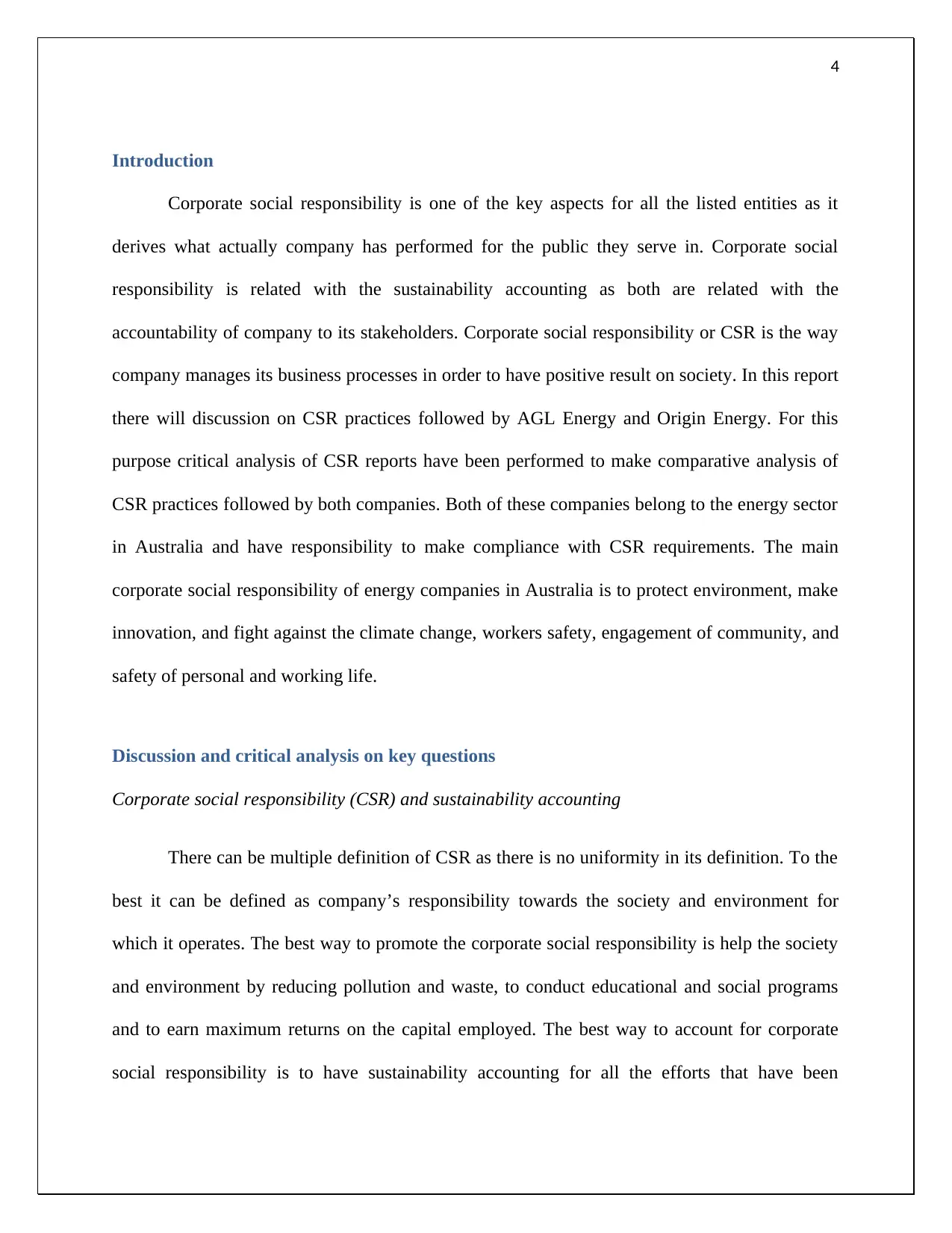
4
Introduction
Corporate social responsibility is one of the key aspects for all the listed entities as it
derives what actually company has performed for the public they serve in. Corporate social
responsibility is related with the sustainability accounting as both are related with the
accountability of company to its stakeholders. Corporate social responsibility or CSR is the way
company manages its business processes in order to have positive result on society. In this report
there will discussion on CSR practices followed by AGL Energy and Origin Energy. For this
purpose critical analysis of CSR reports have been performed to make comparative analysis of
CSR practices followed by both companies. Both of these companies belong to the energy sector
in Australia and have responsibility to make compliance with CSR requirements. The main
corporate social responsibility of energy companies in Australia is to protect environment, make
innovation, and fight against the climate change, workers safety, engagement of community, and
safety of personal and working life.
Discussion and critical analysis on key questions
Corporate social responsibility (CSR) and sustainability accounting
There can be multiple definition of CSR as there is no uniformity in its definition. To the
best it can be defined as company’s responsibility towards the society and environment for
which it operates. The best way to promote the corporate social responsibility is help the society
and environment by reducing pollution and waste, to conduct educational and social programs
and to earn maximum returns on the capital employed. The best way to account for corporate
social responsibility is to have sustainability accounting for all the efforts that have been
Introduction
Corporate social responsibility is one of the key aspects for all the listed entities as it
derives what actually company has performed for the public they serve in. Corporate social
responsibility is related with the sustainability accounting as both are related with the
accountability of company to its stakeholders. Corporate social responsibility or CSR is the way
company manages its business processes in order to have positive result on society. In this report
there will discussion on CSR practices followed by AGL Energy and Origin Energy. For this
purpose critical analysis of CSR reports have been performed to make comparative analysis of
CSR practices followed by both companies. Both of these companies belong to the energy sector
in Australia and have responsibility to make compliance with CSR requirements. The main
corporate social responsibility of energy companies in Australia is to protect environment, make
innovation, and fight against the climate change, workers safety, engagement of community, and
safety of personal and working life.
Discussion and critical analysis on key questions
Corporate social responsibility (CSR) and sustainability accounting
There can be multiple definition of CSR as there is no uniformity in its definition. To the
best it can be defined as company’s responsibility towards the society and environment for
which it operates. The best way to promote the corporate social responsibility is help the society
and environment by reducing pollution and waste, to conduct educational and social programs
and to earn maximum returns on the capital employed. The best way to account for corporate
social responsibility is to have sustainability accounting for all the efforts that have been
Paraphrase This Document
Need a fresh take? Get an instant paraphrase of this document with our AI Paraphraser
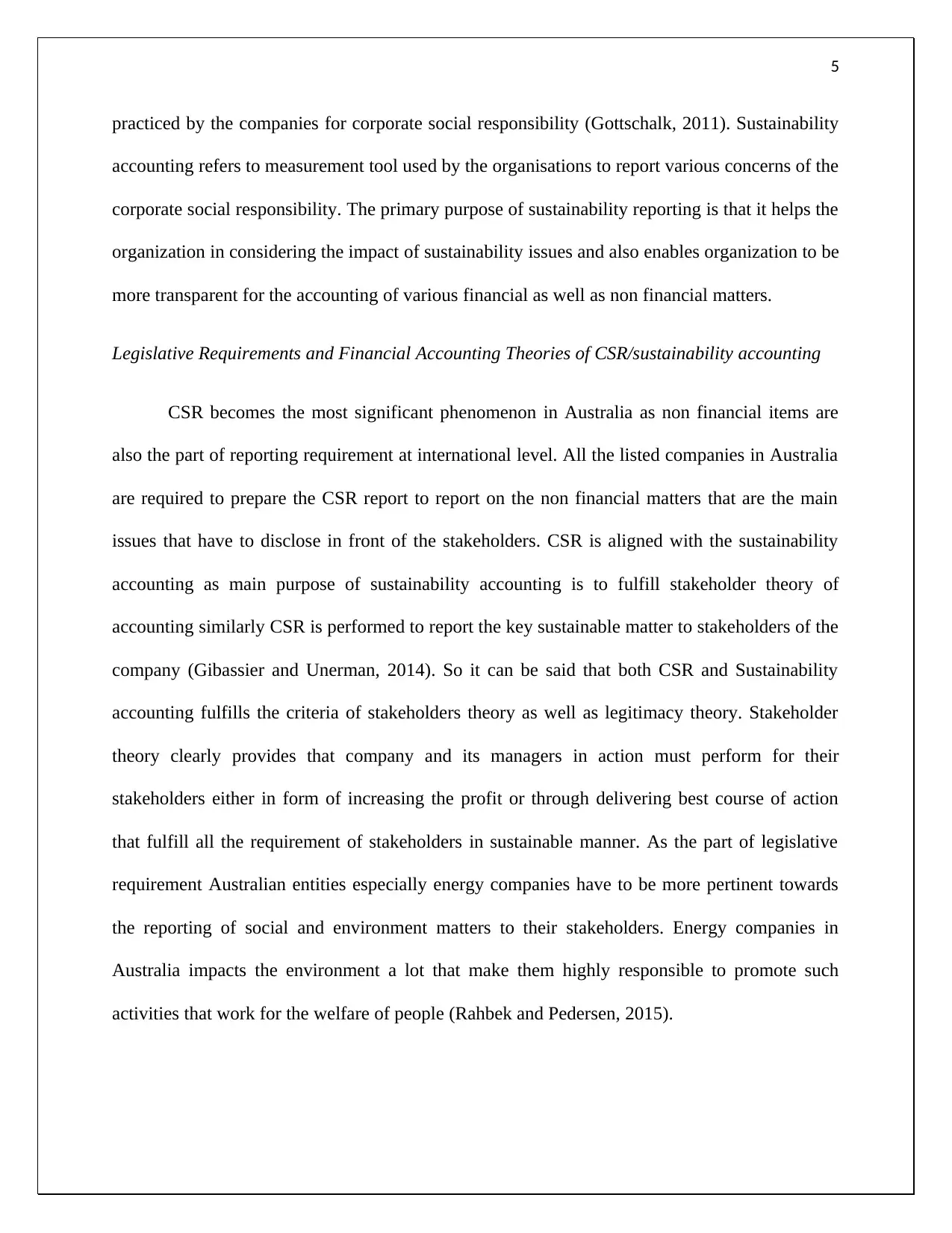
5
practiced by the companies for corporate social responsibility (Gottschalk, 2011). Sustainability
accounting refers to measurement tool used by the organisations to report various concerns of the
corporate social responsibility. The primary purpose of sustainability reporting is that it helps the
organization in considering the impact of sustainability issues and also enables organization to be
more transparent for the accounting of various financial as well as non financial matters.
Legislative Requirements and Financial Accounting Theories of CSR/sustainability accounting
CSR becomes the most significant phenomenon in Australia as non financial items are
also the part of reporting requirement at international level. All the listed companies in Australia
are required to prepare the CSR report to report on the non financial matters that are the main
issues that have to disclose in front of the stakeholders. CSR is aligned with the sustainability
accounting as main purpose of sustainability accounting is to fulfill stakeholder theory of
accounting similarly CSR is performed to report the key sustainable matter to stakeholders of the
company (Gibassier and Unerman, 2014). So it can be said that both CSR and Sustainability
accounting fulfills the criteria of stakeholders theory as well as legitimacy theory. Stakeholder
theory clearly provides that company and its managers in action must perform for their
stakeholders either in form of increasing the profit or through delivering best course of action
that fulfill all the requirement of stakeholders in sustainable manner. As the part of legislative
requirement Australian entities especially energy companies have to be more pertinent towards
the reporting of social and environment matters to their stakeholders. Energy companies in
Australia impacts the environment a lot that make them highly responsible to promote such
activities that work for the welfare of people (Rahbek and Pedersen, 2015).
practiced by the companies for corporate social responsibility (Gottschalk, 2011). Sustainability
accounting refers to measurement tool used by the organisations to report various concerns of the
corporate social responsibility. The primary purpose of sustainability reporting is that it helps the
organization in considering the impact of sustainability issues and also enables organization to be
more transparent for the accounting of various financial as well as non financial matters.
Legislative Requirements and Financial Accounting Theories of CSR/sustainability accounting
CSR becomes the most significant phenomenon in Australia as non financial items are
also the part of reporting requirement at international level. All the listed companies in Australia
are required to prepare the CSR report to report on the non financial matters that are the main
issues that have to disclose in front of the stakeholders. CSR is aligned with the sustainability
accounting as main purpose of sustainability accounting is to fulfill stakeholder theory of
accounting similarly CSR is performed to report the key sustainable matter to stakeholders of the
company (Gibassier and Unerman, 2014). So it can be said that both CSR and Sustainability
accounting fulfills the criteria of stakeholders theory as well as legitimacy theory. Stakeholder
theory clearly provides that company and its managers in action must perform for their
stakeholders either in form of increasing the profit or through delivering best course of action
that fulfill all the requirement of stakeholders in sustainable manner. As the part of legislative
requirement Australian entities especially energy companies have to be more pertinent towards
the reporting of social and environment matters to their stakeholders. Energy companies in
Australia impacts the environment a lot that make them highly responsible to promote such
activities that work for the welfare of people (Rahbek and Pedersen, 2015).
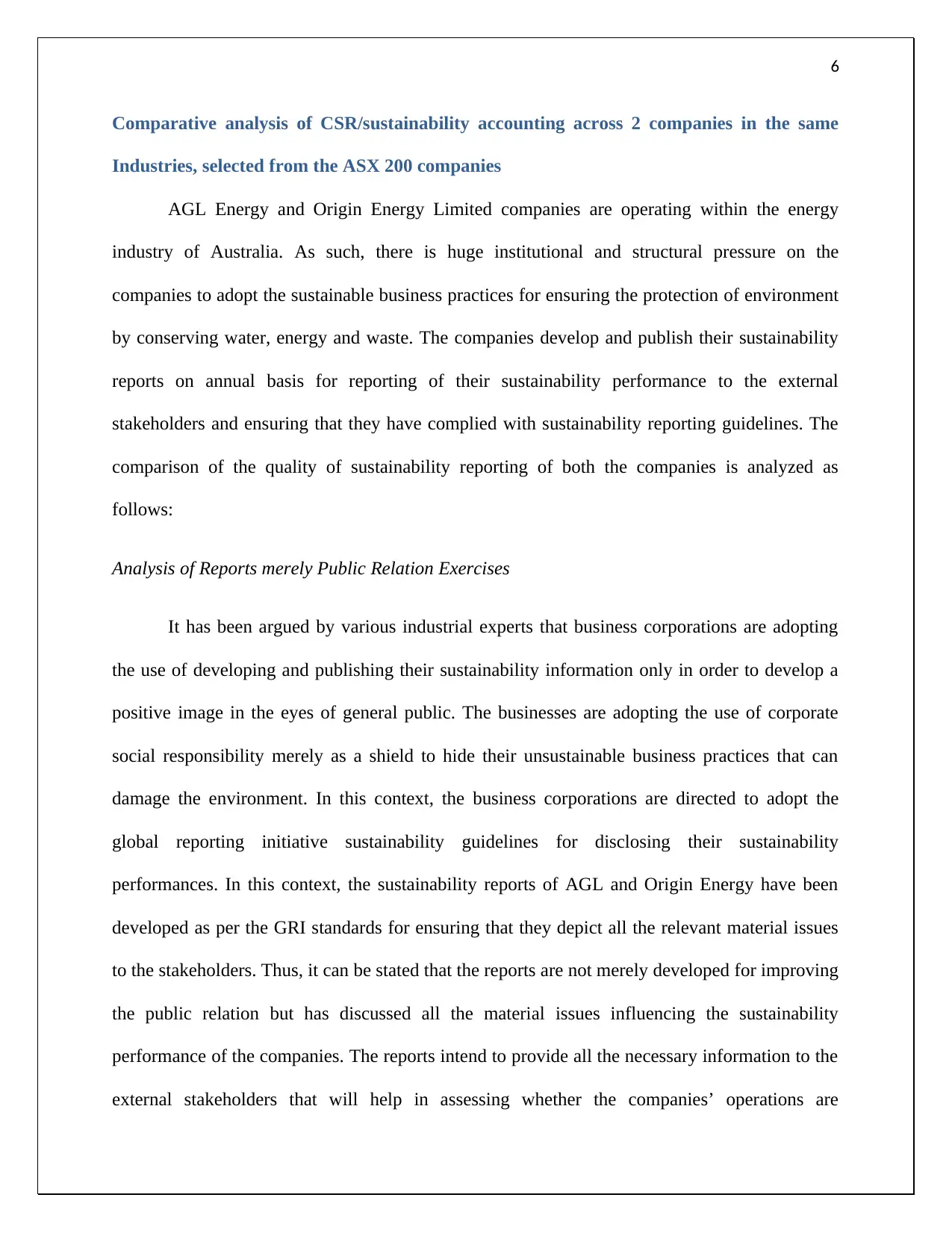
6
Comparative analysis of CSR/sustainability accounting across 2 companies in the same
Industries, selected from the ASX 200 companies
AGL Energy and Origin Energy Limited companies are operating within the energy
industry of Australia. As such, there is huge institutional and structural pressure on the
companies to adopt the sustainable business practices for ensuring the protection of environment
by conserving water, energy and waste. The companies develop and publish their sustainability
reports on annual basis for reporting of their sustainability performance to the external
stakeholders and ensuring that they have complied with sustainability reporting guidelines. The
comparison of the quality of sustainability reporting of both the companies is analyzed as
follows:
Analysis of Reports merely Public Relation Exercises
It has been argued by various industrial experts that business corporations are adopting
the use of developing and publishing their sustainability information only in order to develop a
positive image in the eyes of general public. The businesses are adopting the use of corporate
social responsibility merely as a shield to hide their unsustainable business practices that can
damage the environment. In this context, the business corporations are directed to adopt the
global reporting initiative sustainability guidelines for disclosing their sustainability
performances. In this context, the sustainability reports of AGL and Origin Energy have been
developed as per the GRI standards for ensuring that they depict all the relevant material issues
to the stakeholders. Thus, it can be stated that the reports are not merely developed for improving
the public relation but has discussed all the material issues influencing the sustainability
performance of the companies. The reports intend to provide all the necessary information to the
external stakeholders that will help in assessing whether the companies’ operations are
Comparative analysis of CSR/sustainability accounting across 2 companies in the same
Industries, selected from the ASX 200 companies
AGL Energy and Origin Energy Limited companies are operating within the energy
industry of Australia. As such, there is huge institutional and structural pressure on the
companies to adopt the sustainable business practices for ensuring the protection of environment
by conserving water, energy and waste. The companies develop and publish their sustainability
reports on annual basis for reporting of their sustainability performance to the external
stakeholders and ensuring that they have complied with sustainability reporting guidelines. The
comparison of the quality of sustainability reporting of both the companies is analyzed as
follows:
Analysis of Reports merely Public Relation Exercises
It has been argued by various industrial experts that business corporations are adopting
the use of developing and publishing their sustainability information only in order to develop a
positive image in the eyes of general public. The businesses are adopting the use of corporate
social responsibility merely as a shield to hide their unsustainable business practices that can
damage the environment. In this context, the business corporations are directed to adopt the
global reporting initiative sustainability guidelines for disclosing their sustainability
performances. In this context, the sustainability reports of AGL and Origin Energy have been
developed as per the GRI standards for ensuring that they depict all the relevant material issues
to the stakeholders. Thus, it can be stated that the reports are not merely developed for improving
the public relation but has discussed all the material issues influencing the sustainability
performance of the companies. The reports intend to provide all the necessary information to the
external stakeholders that will help in assessing whether the companies’ operations are
⊘ This is a preview!⊘
Do you want full access?
Subscribe today to unlock all pages.

Trusted by 1+ million students worldwide
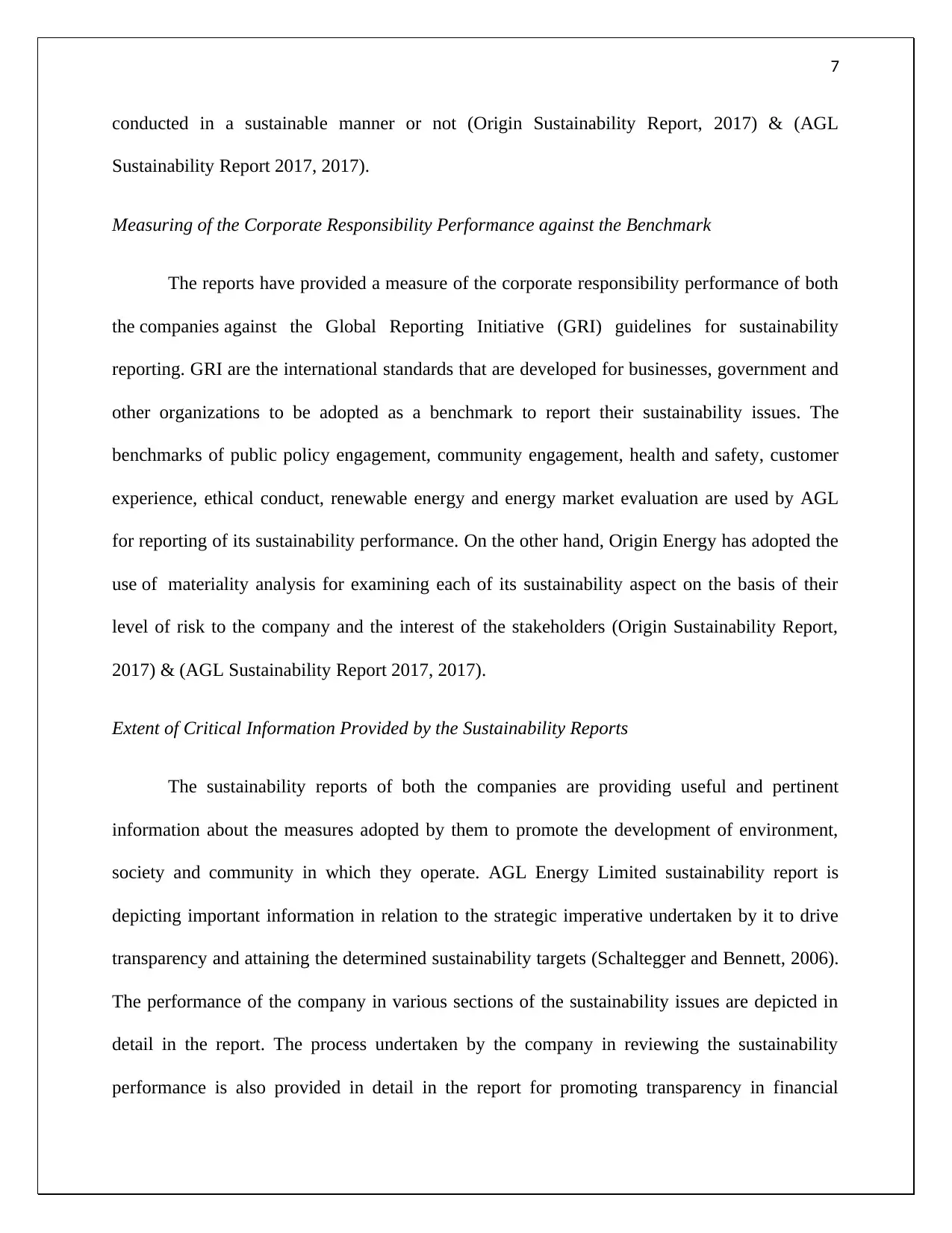
7
conducted in a sustainable manner or not (Origin Sustainability Report, 2017) & (AGL
Sustainability Report 2017, 2017).
Measuring of the Corporate Responsibility Performance against the Benchmark
The reports have provided a measure of the corporate responsibility performance of both
the companies against the Global Reporting Initiative (GRI) guidelines for sustainability
reporting. GRI are the international standards that are developed for businesses, government and
other organizations to be adopted as a benchmark to report their sustainability issues. The
benchmarks of public policy engagement, community engagement, health and safety, customer
experience, ethical conduct, renewable energy and energy market evaluation are used by AGL
for reporting of its sustainability performance. On the other hand, Origin Energy has adopted the
use of materiality analysis for examining each of its sustainability aspect on the basis of their
level of risk to the company and the interest of the stakeholders (Origin Sustainability Report,
2017) & (AGL Sustainability Report 2017, 2017).
Extent of Critical Information Provided by the Sustainability Reports
The sustainability reports of both the companies are providing useful and pertinent
information about the measures adopted by them to promote the development of environment,
society and community in which they operate. AGL Energy Limited sustainability report is
depicting important information in relation to the strategic imperative undertaken by it to drive
transparency and attaining the determined sustainability targets (Schaltegger and Bennett, 2006).
The performance of the company in various sections of the sustainability issues are depicted in
detail in the report. The process undertaken by the company in reviewing the sustainability
performance is also provided in detail in the report for promoting transparency in financial
conducted in a sustainable manner or not (Origin Sustainability Report, 2017) & (AGL
Sustainability Report 2017, 2017).
Measuring of the Corporate Responsibility Performance against the Benchmark
The reports have provided a measure of the corporate responsibility performance of both
the companies against the Global Reporting Initiative (GRI) guidelines for sustainability
reporting. GRI are the international standards that are developed for businesses, government and
other organizations to be adopted as a benchmark to report their sustainability issues. The
benchmarks of public policy engagement, community engagement, health and safety, customer
experience, ethical conduct, renewable energy and energy market evaluation are used by AGL
for reporting of its sustainability performance. On the other hand, Origin Energy has adopted the
use of materiality analysis for examining each of its sustainability aspect on the basis of their
level of risk to the company and the interest of the stakeholders (Origin Sustainability Report,
2017) & (AGL Sustainability Report 2017, 2017).
Extent of Critical Information Provided by the Sustainability Reports
The sustainability reports of both the companies are providing useful and pertinent
information about the measures adopted by them to promote the development of environment,
society and community in which they operate. AGL Energy Limited sustainability report is
depicting important information in relation to the strategic imperative undertaken by it to drive
transparency and attaining the determined sustainability targets (Schaltegger and Bennett, 2006).
The performance of the company in various sections of the sustainability issues are depicted in
detail in the report. The process undertaken by the company in reviewing the sustainability
performance is also provided in detail in the report for promoting transparency in financial
Paraphrase This Document
Need a fresh take? Get an instant paraphrase of this document with our AI Paraphraser
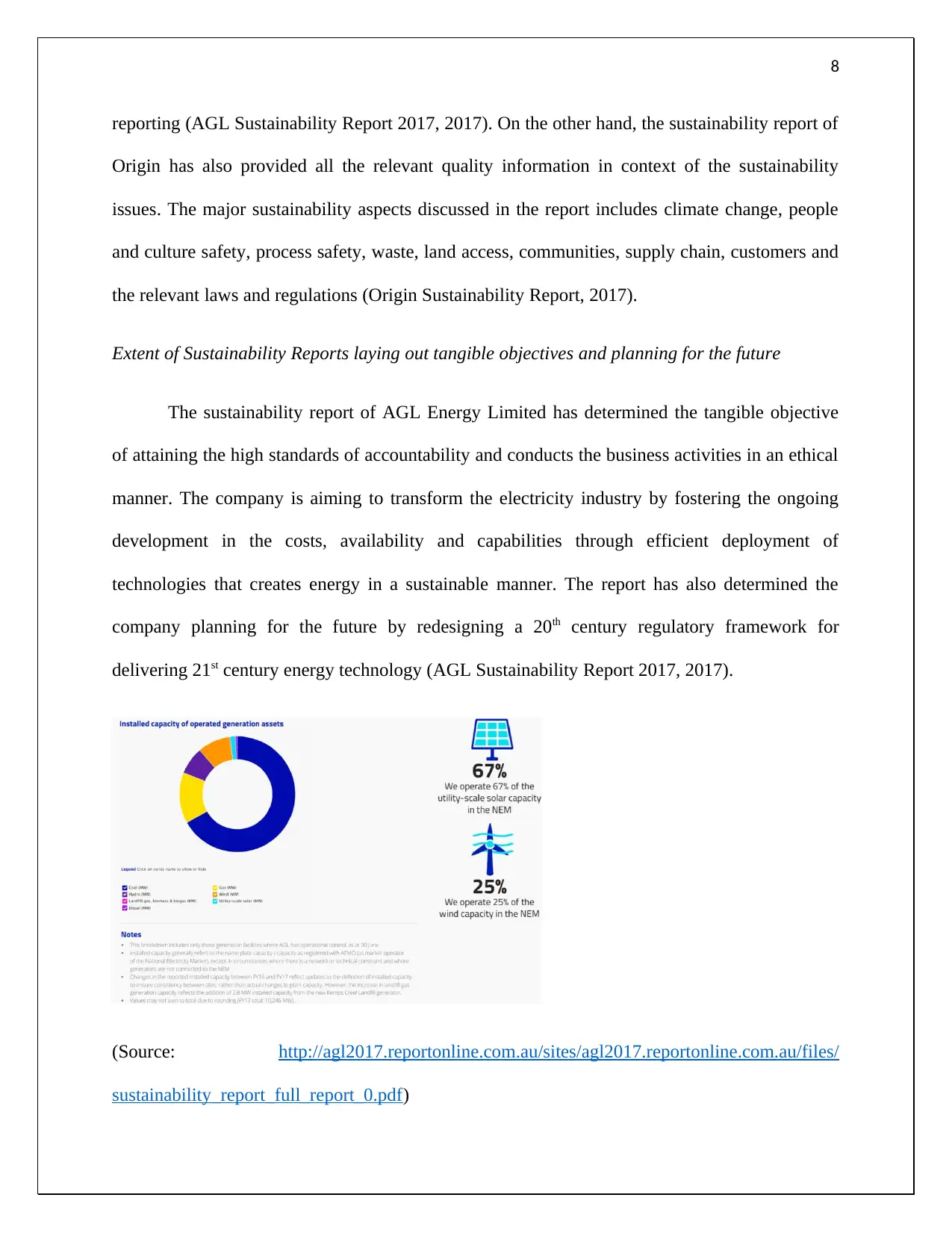
8
reporting (AGL Sustainability Report 2017, 2017). On the other hand, the sustainability report of
Origin has also provided all the relevant quality information in context of the sustainability
issues. The major sustainability aspects discussed in the report includes climate change, people
and culture safety, process safety, waste, land access, communities, supply chain, customers and
the relevant laws and regulations (Origin Sustainability Report, 2017).
Extent of Sustainability Reports laying out tangible objectives and planning for the future
The sustainability report of AGL Energy Limited has determined the tangible objective
of attaining the high standards of accountability and conducts the business activities in an ethical
manner. The company is aiming to transform the electricity industry by fostering the ongoing
development in the costs, availability and capabilities through efficient deployment of
technologies that creates energy in a sustainable manner. The report has also determined the
company planning for the future by redesigning a 20th century regulatory framework for
delivering 21st century energy technology (AGL Sustainability Report 2017, 2017).
(Source: http://agl2017.reportonline.com.au/sites/agl2017.reportonline.com.au/files/
sustainability_report_full_report_0.pdf)
reporting (AGL Sustainability Report 2017, 2017). On the other hand, the sustainability report of
Origin has also provided all the relevant quality information in context of the sustainability
issues. The major sustainability aspects discussed in the report includes climate change, people
and culture safety, process safety, waste, land access, communities, supply chain, customers and
the relevant laws and regulations (Origin Sustainability Report, 2017).
Extent of Sustainability Reports laying out tangible objectives and planning for the future
The sustainability report of AGL Energy Limited has determined the tangible objective
of attaining the high standards of accountability and conducts the business activities in an ethical
manner. The company is aiming to transform the electricity industry by fostering the ongoing
development in the costs, availability and capabilities through efficient deployment of
technologies that creates energy in a sustainable manner. The report has also determined the
company planning for the future by redesigning a 20th century regulatory framework for
delivering 21st century energy technology (AGL Sustainability Report 2017, 2017).
(Source: http://agl2017.reportonline.com.au/sites/agl2017.reportonline.com.au/files/
sustainability_report_full_report_0.pdf)
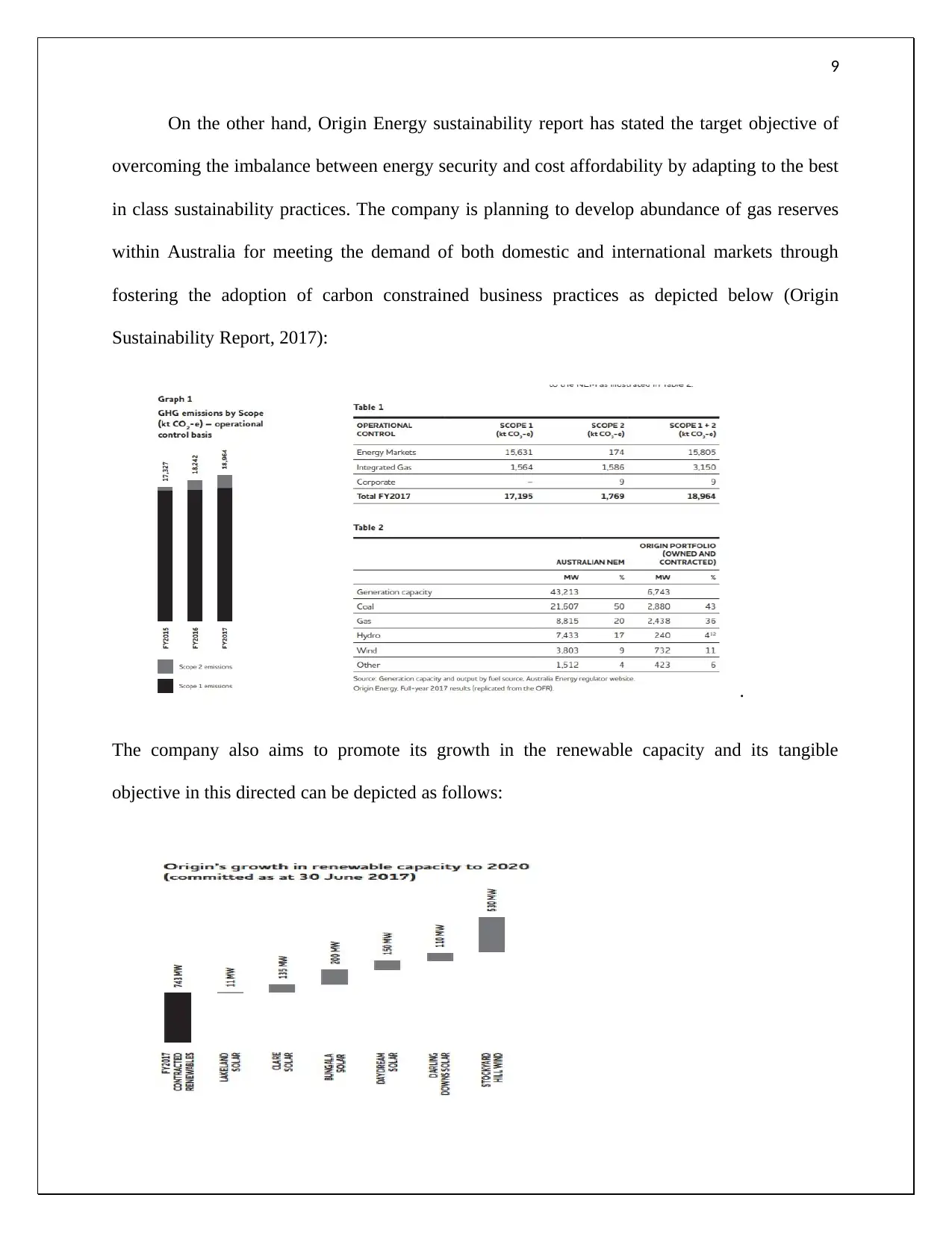
9
On the other hand, Origin Energy sustainability report has stated the target objective of
overcoming the imbalance between energy security and cost affordability by adapting to the best
in class sustainability practices. The company is planning to develop abundance of gas reserves
within Australia for meeting the demand of both domestic and international markets through
fostering the adoption of carbon constrained business practices as depicted below (Origin
Sustainability Report, 2017):
.
The company also aims to promote its growth in the renewable capacity and its tangible
objective in this directed can be depicted as follows:
On the other hand, Origin Energy sustainability report has stated the target objective of
overcoming the imbalance between energy security and cost affordability by adapting to the best
in class sustainability practices. The company is planning to develop abundance of gas reserves
within Australia for meeting the demand of both domestic and international markets through
fostering the adoption of carbon constrained business practices as depicted below (Origin
Sustainability Report, 2017):
.
The company also aims to promote its growth in the renewable capacity and its tangible
objective in this directed can be depicted as follows:
⊘ This is a preview!⊘
Do you want full access?
Subscribe today to unlock all pages.

Trusted by 1+ million students worldwide
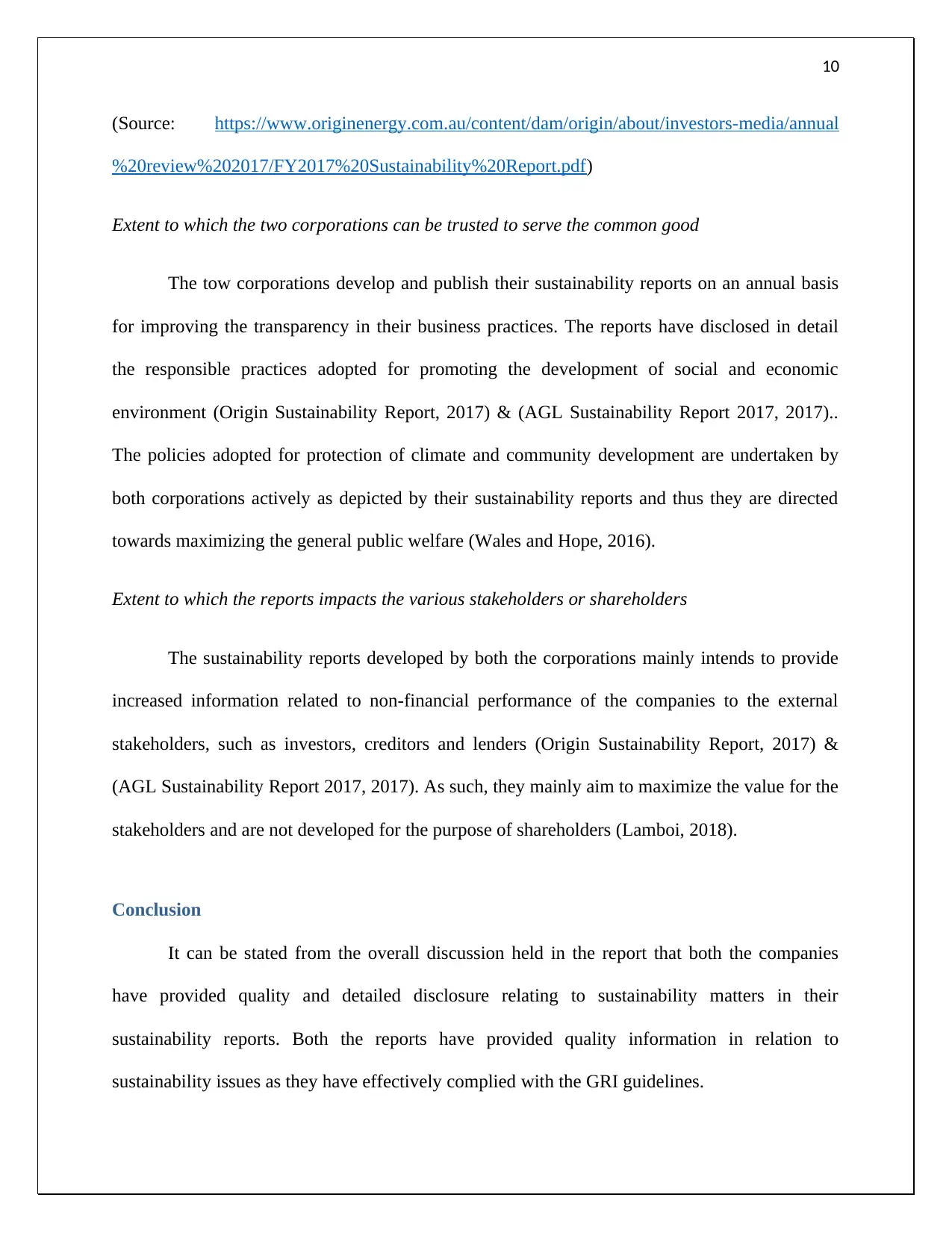
10
(Source: https://www.originenergy.com.au/content/dam/origin/about/investors-media/annual
%20review%202017/FY2017%20Sustainability%20Report.pdf)
Extent to which the two corporations can be trusted to serve the common good
The tow corporations develop and publish their sustainability reports on an annual basis
for improving the transparency in their business practices. The reports have disclosed in detail
the responsible practices adopted for promoting the development of social and economic
environment (Origin Sustainability Report, 2017) & (AGL Sustainability Report 2017, 2017)..
The policies adopted for protection of climate and community development are undertaken by
both corporations actively as depicted by their sustainability reports and thus they are directed
towards maximizing the general public welfare (Wales and Hope, 2016).
Extent to which the reports impacts the various stakeholders or shareholders
The sustainability reports developed by both the corporations mainly intends to provide
increased information related to non-financial performance of the companies to the external
stakeholders, such as investors, creditors and lenders (Origin Sustainability Report, 2017) &
(AGL Sustainability Report 2017, 2017). As such, they mainly aim to maximize the value for the
stakeholders and are not developed for the purpose of shareholders (Lamboi, 2018).
Conclusion
It can be stated from the overall discussion held in the report that both the companies
have provided quality and detailed disclosure relating to sustainability matters in their
sustainability reports. Both the reports have provided quality information in relation to
sustainability issues as they have effectively complied with the GRI guidelines.
(Source: https://www.originenergy.com.au/content/dam/origin/about/investors-media/annual
%20review%202017/FY2017%20Sustainability%20Report.pdf)
Extent to which the two corporations can be trusted to serve the common good
The tow corporations develop and publish their sustainability reports on an annual basis
for improving the transparency in their business practices. The reports have disclosed in detail
the responsible practices adopted for promoting the development of social and economic
environment (Origin Sustainability Report, 2017) & (AGL Sustainability Report 2017, 2017)..
The policies adopted for protection of climate and community development are undertaken by
both corporations actively as depicted by their sustainability reports and thus they are directed
towards maximizing the general public welfare (Wales and Hope, 2016).
Extent to which the reports impacts the various stakeholders or shareholders
The sustainability reports developed by both the corporations mainly intends to provide
increased information related to non-financial performance of the companies to the external
stakeholders, such as investors, creditors and lenders (Origin Sustainability Report, 2017) &
(AGL Sustainability Report 2017, 2017). As such, they mainly aim to maximize the value for the
stakeholders and are not developed for the purpose of shareholders (Lamboi, 2018).
Conclusion
It can be stated from the overall discussion held in the report that both the companies
have provided quality and detailed disclosure relating to sustainability matters in their
sustainability reports. Both the reports have provided quality information in relation to
sustainability issues as they have effectively complied with the GRI guidelines.
Paraphrase This Document
Need a fresh take? Get an instant paraphrase of this document with our AI Paraphraser

11
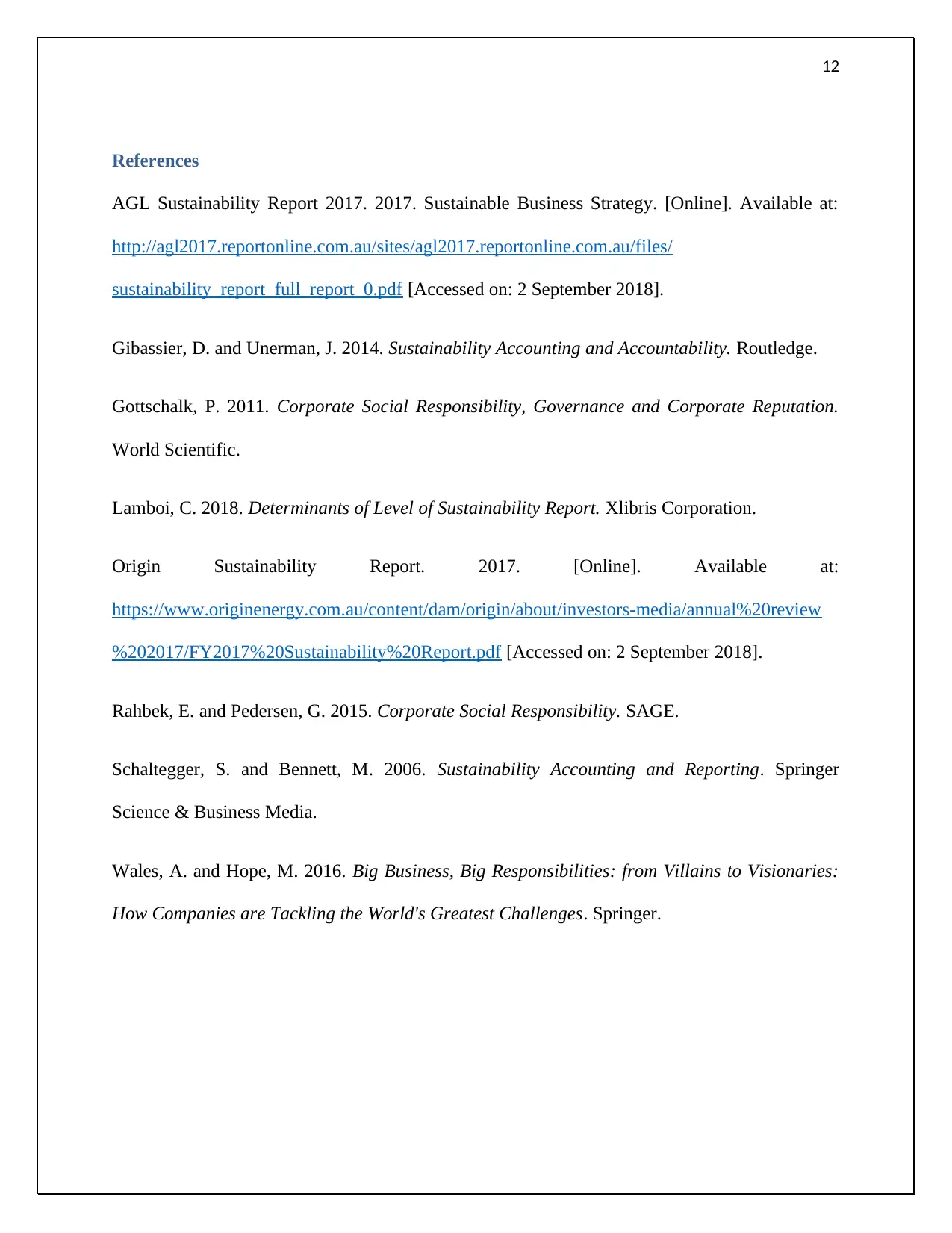
12
References
AGL Sustainability Report 2017. 2017. Sustainable Business Strategy. [Online]. Available at:
http://agl2017.reportonline.com.au/sites/agl2017.reportonline.com.au/files/
sustainability_report_full_report_0.pdf [Accessed on: 2 September 2018].
Gibassier, D. and Unerman, J. 2014. Sustainability Accounting and Accountability. Routledge.
Gottschalk, P. 2011. Corporate Social Responsibility, Governance and Corporate Reputation.
World Scientific.
Lamboi, C. 2018. Determinants of Level of Sustainability Report. Xlibris Corporation.
Origin Sustainability Report. 2017. [Online]. Available at:
https://www.originenergy.com.au/content/dam/origin/about/investors-media/annual%20review
%202017/FY2017%20Sustainability%20Report.pdf [Accessed on: 2 September 2018].
Rahbek, E. and Pedersen, G. 2015. Corporate Social Responsibility. SAGE.
Schaltegger, S. and Bennett, M. 2006. Sustainability Accounting and Reporting. Springer
Science & Business Media.
Wales, A. and Hope, M. 2016. Big Business, Big Responsibilities: from Villains to Visionaries:
How Companies are Tackling the World's Greatest Challenges. Springer.
References
AGL Sustainability Report 2017. 2017. Sustainable Business Strategy. [Online]. Available at:
http://agl2017.reportonline.com.au/sites/agl2017.reportonline.com.au/files/
sustainability_report_full_report_0.pdf [Accessed on: 2 September 2018].
Gibassier, D. and Unerman, J. 2014. Sustainability Accounting and Accountability. Routledge.
Gottschalk, P. 2011. Corporate Social Responsibility, Governance and Corporate Reputation.
World Scientific.
Lamboi, C. 2018. Determinants of Level of Sustainability Report. Xlibris Corporation.
Origin Sustainability Report. 2017. [Online]. Available at:
https://www.originenergy.com.au/content/dam/origin/about/investors-media/annual%20review
%202017/FY2017%20Sustainability%20Report.pdf [Accessed on: 2 September 2018].
Rahbek, E. and Pedersen, G. 2015. Corporate Social Responsibility. SAGE.
Schaltegger, S. and Bennett, M. 2006. Sustainability Accounting and Reporting. Springer
Science & Business Media.
Wales, A. and Hope, M. 2016. Big Business, Big Responsibilities: from Villains to Visionaries:
How Companies are Tackling the World's Greatest Challenges. Springer.
⊘ This is a preview!⊘
Do you want full access?
Subscribe today to unlock all pages.

Trusted by 1+ million students worldwide
1 out of 12
Related Documents
Your All-in-One AI-Powered Toolkit for Academic Success.
+13062052269
info@desklib.com
Available 24*7 on WhatsApp / Email
![[object Object]](/_next/static/media/star-bottom.7253800d.svg)
Unlock your academic potential
Copyright © 2020–2026 A2Z Services. All Rights Reserved. Developed and managed by ZUCOL.





